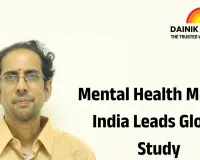Our Silent Epidemic: Why India is Failing its Mental Health
Digital Desk
.jpg)
Close your eyes and picture a student in Kota. The pressure isn't just a vague feeling; it's a physical weight on their chest, a constant whisper of "you are not enough." Now, imagine that whisper turning into a scream, with nowhere to go. This isn't a scene from a movie; it's the daily reality for millions, and it’s time we call it what it is: India’s other silent epidemic.
We are a nation obsessed with GDP, infrastructure, and visible progress. Yet, we are willfully blind to a crisis that is corroding our very core. With an estimated 230 million Indians suffering from mental disorders and treatment gaps as high as 92% for some conditions, we are sitting on a ticking time bomb. We have built IITs and AIIMS, but we have only 0.75 psychiatrists for every 100,000 people. When a young person in despair turns to an AI chatbot for comfort because the system offers none, what does that say about our priorities?
The stigma is our biggest enemy. We treat mental illness as a personal failure, a character flaw to be hidden away, rather than a medical condition to be treated with compassion and science. This stigma silences sufferers, terrifies families, and lets our policymakers off the hook. We would never accept a 70% treatment gap for cancer or diabetes, yet we shrug our shoulders when it comes to depression and anxiety.
The economic cost is staggering—over a trillion dollars in lost productivity by some estimates. But the human cost is incalculable. It’s the lost potential, the broken families, the quiet, preventable tragedies that unfold behind closed doors.
The solution requires a revolution in thinking. We need to integrate mental health into primary care, making it as accessible as a check-up for a fever. We need public awareness campaigns that normalize the conversation, telling people it’s okay to not be okay. Most importantly, we need to demand that our governments invest in mental health with the same urgency they reserve for physical infrastructure.
The next time you feel that heaviness, or see it in a friend’s eyes, will you dismiss it? Or will you see it for what it is—a symptom of a national emergency we can no longer afford to ignore?


2.jpg)
3.jpg)

.jpg)
.jpg)
.jpg)
.jpg)
.jpg)
.jpg)
